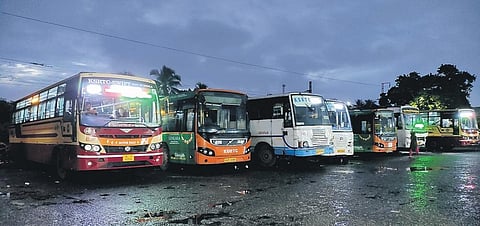

KOCHI: Faced with financial constraints in acquiring new buses, the state government has decided to extend the lifespan of KSRTC’s long-distance fleet to 12 years. That is an increase of three years from the previous age-limit of nine for superclass buses.
“We are grappling with a shortage of buses for superclass services. This decision offers a pragmatic solution, allowing us to keep these buses operational on the roads without requiring substantial capital investment,” said a source with the transport department.
According to a draft notification released by Transport Secretary Biju Prabhakar, the proposed alteration involves amending sub-rule (1) of Rule 260A of the Kerala Motor Vehicles Rules 1989, signifying a key adjustment in transportation regulations. The notification stipulates, “A stage carriage older than 12 years from the date of its registration shall not be permitted to be operated as a fast passenger, super-fast service, a luxury service, a super deluxe service, or super express service.”
The report sourced from the transport department says that a total of 1,695 superclass buses, including Volvo multi-axle and Scania buses, are currently engaged in long-distance stage carriage services. With the new move, KSRTC will have the benefit of utilising 694 buses for an additional two years, helping to avoid a significant capital investment.
In less than three years, the government has thrice extended the validity of superclass buses as a strategic measure to curtail the additional costs associated with procuring new KSRTC buses. Commencing with an extension from five years to seven years in 2020, the validity was further prolonged from seven to nine in 2022.
However, transport sources also pointed out that the move would pose challenges, as maintenance costs and breakdowns of buses are likely to increase.
“Since long-distance buses operate nearly 600km a day, the wear and tear of buses is high. If we are forced to operate for another three years, it will certainly affect the service that we are delivering to the passengers,” said a source.
Meanwhile, members of the private bus operators association have come out against the transport department’s move.
“By increasing the validity of long-distance buses, the government is compromising on the safety, seating comfort and convenience of passengers. If they don’t have the resources to conduct the service, they should be ready to hand over the route to private bus operators. We are ready to conduct the service on long-distance routes with modern vehicles,” said Siby Holymaria, a private bus owner.
KSRTC Fleet
Total superclass
buses: 1,695
Fast Passenger: 1,150
Super Fast: 359
Super Express: 52
Super Deluxe: 108
Volvo Multy Axle: 09
Scania: 17
Buses benefiting because of lifespan extension
2023-24: 173
2024-25: 521